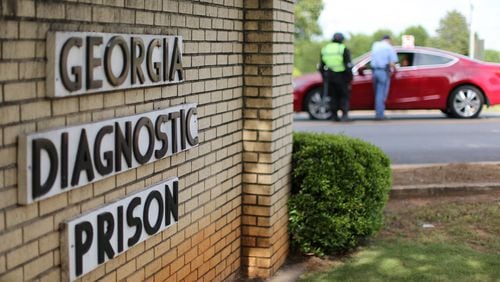For seven years, inmate Timothy Gumm lived in a 7-foot-by-13-foot cell with no outside air or sunlight and, for a long while, no contact with anyone other than a correctional officer who slid a food tray through a slot in the metal door. The charge that landed Gumm in solitary confinement — that he attempted to escape from behind bars — was dropped. Still, he would remain there for years.
Now the extreme isolation Gumm faced at the Georgia Diagnostic and Classification Prison near Jackson is the subject a lawsuit, which argues such confinement is an unconstitutional “torture technique.”
Filed in federal court by the Southern Center for Human Rights, the legal complaint provides a detailed look into an area of the Georgia prison system that has been cloaked in secrecy — the Special Management Unit (SMU), or Tier III program.
Until recently, Gumm was one of the roughly 200 Georgia inmates housed in Tier III units. Such extreme confinement, wrote Southern Center managing attorney Sarah Geraghty, has "detrimental effects on physical and mental health that are obvious to a reasonable person."
RELATED: Report faults Georgia prison guards in inmate escapes
RELATED: 46 Georgia prison guards charged with transporting drugs
“Indefinite solitary confinement violates contemporary standards of decency and defies a consensus among correctional experts, who condemn the practice,” Geraghty continued.
Gumm initially drafted and filed the federal lawsuit in 2015 challenging his detention himself. The Southern Center for Human Rights agreed last year to provide attorneys and weighed in with an amendment on Tuesday filed on behalf of all the SMU prisoners.
The Department of Corrections declined to comment on pending litigation. But in documents the state filed before this latest amendement, attorneys for the Corrections officials said the prison system denies claims that Gumm “has been subjected to the deprivation of any rights, privileges or immunities secured by the Constitution or laws of the United States.”
Charges expunged; Isolation Continues
The little-known unit was put in place a decade ago at the prison in Jackson that also houses Death Row, but policies overseeing it were not put in place until 2012. Recently a similar program was established at the Georgia State Prison at Reidsville, Geraghty said. It was created for extremely dangerous inmates or those who have serious disciplinary problems, but not all of them fall into those categories, the legal complaint noted.
Gumm was serving life for a 1994 rape at Telfair State Prison when he was transferred to SMU for his alleged involvement in an escape. Other inmates told investigators Gumm "involved" but they also said he "abandoned the effort and returned to his cell," according to an amendment filed Tuesday to a 2015 lawsuit. The escape charge was expunged from Gumm's prison record. Yet he was left in SMU.
Under a 2012 DOC policy, SMU inmates must be evaluated every 90 days. Since that policy was put in place, Gumm has been reviewed 17 times. Fifteen times the review committee and the warden signed off on his transfer from SMU. The suit did not provide a reason Gumm remained on SMU, but it noted that several times those decisions to transfer Gumm were countered by the central office.
The lawsuit said at its most restrictive, SMU does not allow inmates to leave their cells at all and reading material in prohibited. Showers are taken in the cell. For their first 90 days, these inmates can leave their cells for nothing, the legal papers allege.
But there are “phases” that will allow inmates slightly more freedom, such as four 15-minute phone calls a month, out-of-cell showers while still handcuffed and shackled or time in an exercise pen twice a week.
SMU inmates initially get no visitors though with good behavior they can eventually earn “no contact” visits with family, talking to them on the other side of Plexiglas via a speaker box, that often doesn’t work properly.
“The SMU’s 192 solitary confinement cells are specially designed to isolate people by depriving them of sensory stimuli and restricting their movement. Deprivation of visual stimuli is accomplished by sealing off SMU cells from the outside world,” the complaint said.
“Although GDC policies require that people in segregation spend some time out of cells, in practice, people often report that they are left in their cells for weeks — even months — without ever leaving,” according to the complaint.
Healthy inmates in strict confinement for 10 days begin to develop physical ailments like insomnia, dizziness, heart palpitations, deteriorated vision, weight loss, severe digestive problems, back and joint pain. The amended complaint said Gumm lost 40 pounds in less than three years, also because SMU inmates receive food that is “inedible or have less nutritional content,” is under-cooked or cold, rotten or beyond the expiration date. Extended strict confinement can lead to mental illness.
“Many people confined there and in other solitary confinement units in Georgia have serious mental illness. We often find they are delusional and have lost touch with reality, conditions that are likely exacerbated by prolonged solitary confinement,” Geraghty wrote.
Solitary Confinement Under Scrutiny
The conditions at the Georgia prison, as described in the suit, resemble the supermax facility at the federal prison in Colorado where the nation’s most dangerous criminals are housed. Ramzi Yousef, the mastermind behind the 1993 attack on the World Trade Center, Unabomber Ted Kaczysnki and Olympic bomber Eric Rudolph all spend 23 hours a day alone in their 7-by-12-foot concrete cells there. Like Georgia’s SMU, federal supermax inmates receive all their meals on trays slid through slots in the door and their only human contact is with guards.
The lawsuit in Georgia comes after several states have changed their solitary confinement programs. Colorado prisoners must have at least four hours a day outside their cells. Washington and Pennsylvania now use educational programs rather than solitary confinement. And the federal government and 17 states now limited the use of solitary confinement.
The Association of State Correctional Administrators said in a news release prolong isolation of inmates “is a grave problem in the United States.”
The U.S. Department of Justice almost three years ago released a report which said that while solitary confinement is necessary in some cases it should be used sparingly.
Former President Barack Obama wrote in an op-ed in the Washington Post in January 2016 solitary confinement “doesn’t make us safer. It is an affront to our humanity.”
The Pope and the United Nations have classified it as torture.
The U.S. Supreme Court has not ruled directly on the issue but held in an Ohio case in 2005 that prison officials cannot confine prisoners in long-term solitary confinement in a super maximum prison without first allowing them to challenge it. In a 2015 case, Justice Anthony Kennedy wrote “near-total isolation exacts a terrible price,” long understood by courts and commentators.
The Georgia lawsuit said that inmates held in such isolated conditions will eventually become society’s problem..
In 2015, 13 of the 16 prisoners released from the SMU were also released from prison because they had served all their sentences. Last year, another 13 inmates were released from SMU and prison at the same time.
“Despite knowing that these prisoners will return to free society with little or no correctional control, defendants (DOC) refuse to give them an opportunity to conform their conduct to an ordinary prison environment while they are in prison,” the suit said.
About the Author






